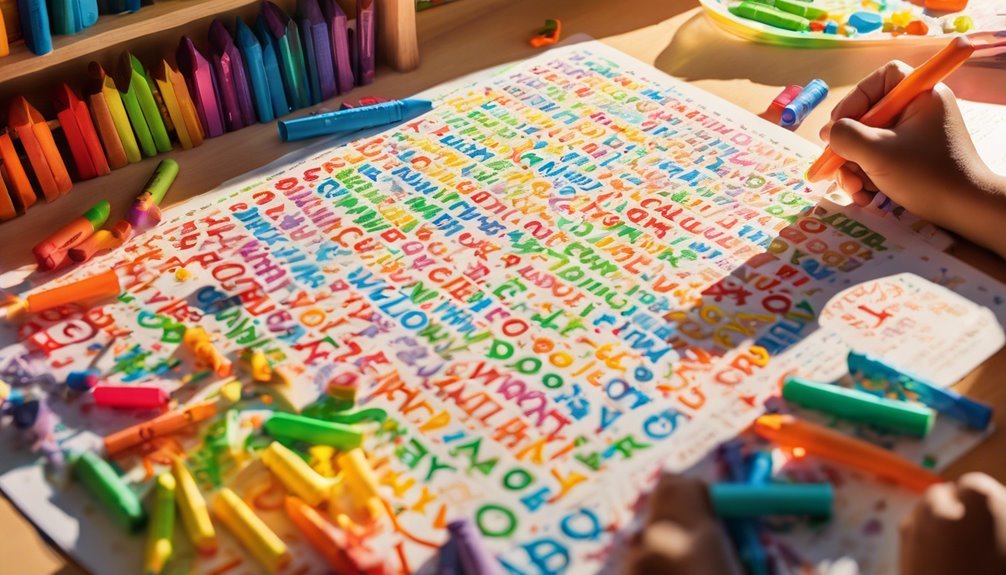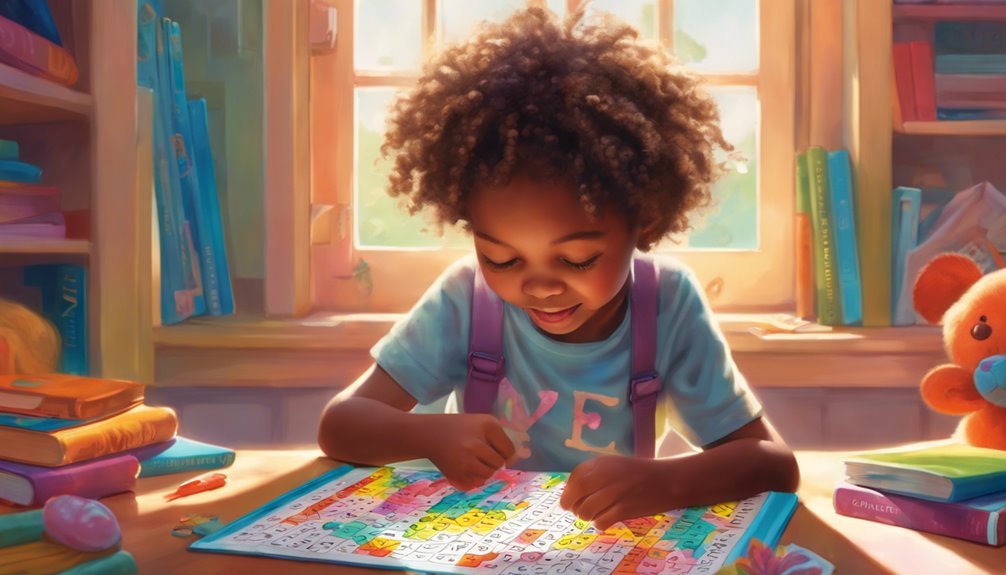Have you noticed how word search puzzles can transform the way young readers approach learning? These engaging activities not only make recognizing letters enjoyable but also expand vocabulary in a playful manner. As kids tackle these challenges, they cultivate problem-solving skills and develop a genuine love for literacy. The sense of accomplishment that comes from completing a puzzle fosters confidence, creating a ripple effect in their educational journey. Imagine what this could mean for their future…
Key Takeaways
- Word search puzzles enhance letter recognition, laying a strong foundation for advanced reading skills and boosting overall confidence in young readers.
- Engaging with word searches expands vocabulary, making reading more enjoyable and improving communication skills, fostering confidence in discussions.
- The challenge of solving puzzles encourages creative thinking and problem-solving abilities, leading to a sense of accomplishment that builds self-esteem.
- Consistent practice with word searches reinforces word recognition and cognitive skills, helping children feel more capable and confident in their reading abilities.
- Celebrating achievements in completing puzzles creates positive reinforcement, motivating young readers to continue their learning journey with confidence.
The Basics of Word Search Puzzles
Word search puzzles are a fantastic tool for building confidence in young readers. These engaging activities have a rich word search history, tracing back to the early 1960s, when they first captivated minds.
You'll find numerous puzzle variations, from themed searches to those focusing on vocabulary development. Each puzzle presents an exciting challenge, making reading feel less intimidating and more enjoyable.
As you dive into the letters, you sharpen your word recognition skills and enhance your cognitive abilities. Solving these puzzles fosters a sense of accomplishment; each completed search boosts self-esteem and motivates further exploration of language.
Enhancing Letter Recognition
Engaging with activities like word search puzzles naturally leads to improved letter recognition, a fundamental skill for young readers.
As you navigate these puzzles, your focus shifts to letter identification, enhancing both your cognitive and visual recognition abilities. Each time you scan for a letter, you reinforce your understanding of the alphabet and its shapes, allowing you to become more confident in recognizing letters in various contexts.
This targeted practice sharpens your ability to distinguish between similar-looking letters, a crucial step toward reading fluency. By consistently engaging in word searches, you'll transform letter recognition from a basic skill into a solid foundation, paving the way for more advanced reading skills.
Embrace this fun challenge and watch your confidence soar!
Building Vocabulary Skills

While building your vocabulary, you'll discover that a rich word bank not only enhances comprehension but also boosts confidence in communication. Engaging with word search puzzles can be an enjoyable way to facilitate vocabulary expansion, leading to greater language comprehension.
As you solve these puzzles, you'll experience:
- Increased word recognition, making reading more enjoyable.
- Enhanced ability to articulate thoughts and ideas.
- Greater confidence when participating in discussions.
- A sense of achievement that fuels your learning journey.
Embrace the challenge of discovering new words and their meanings. With each puzzle, you're not just playing; you're mastering the art of language.
Encouraging Problem-Solving Abilities
As you nurture young readers, fostering their problem-solving abilities becomes essential for their overall development. Engaging with word search puzzles encourages creative thinking, allowing children to explore various strategies as they hunt for letters and patterns.
This playful challenge not only keeps them entertained but also sharpens their analytical skills. When they encounter a particularly tricky puzzle, they'll learn to break it down, identifying potential patterns and honing their focus.
By overcoming these challenges, young readers gain a sense of accomplishment that boosts their confidence. Each solved puzzle reinforces their problem-solving toolkit, preparing them for future academic endeavors.
Fostering a Love for Reading

To truly foster a love for reading, it's important to create an inviting environment that sparks curiosity and excitement about books.
You can cultivate positive reading habits and encourage literary exploration by incorporating these elements:
- Diverse Books: Provide a variety of genres and topics to cater to different interests.
- Comfortable Spaces: Create cozy reading nooks that invite young readers to dive into stories.
- Reading Time: Dedicate time each day for reading, making it a special ritual.
- Discussion: Engage in conversations about books, allowing young readers to express their thoughts and feelings.
Instilling a Sense of Accomplishment
When you celebrate the milestones in a young reader's journey, you not only instill a sense of accomplishment but also motivate them to keep exploring the world of books.
Completing word search puzzles offers a tangible way for children to experience a sense of achievement. Each solved puzzle reinforces their skills, helping them recognize their progress. This recognition boosts self-esteem, encouraging them to tackle more complex challenges.
As they find words and see their efforts pay off, they build resilience and the confidence needed to dive into new reading adventures. By actively engaging in this process, you empower them to take pride in their abilities, fostering a lifelong love for learning and reading.
Tips for Parents to Support Word Search Activities

Five effective strategies can help you support your child during word search activities, making the experience both enjoyable and educational.
Here's how you can elevate their skills:
- Create a routine: Set aside dedicated time for word searches as part of interactive games.
- Encourage teamwork: Turn it into a family challenge, fostering collaboration and fun.
- Celebrate achievements: Acknowledge their progress, boosting their confidence and motivation.
- Discuss new words: Use word searches as a springboard for vocabulary building and discussions.
Frequently Asked Questions
Are There Specific Age Recommendations for Word Search Puzzles?
When choosing word search puzzles, age appropriateness is key. For younger kids, look for puzzles with fewer words and larger grids to match their developing skills.
As they grow, you can introduce more complex difficulty levels, ensuring they stay challenged without feeling overwhelmed. Tailoring the puzzles to their age not only keeps them engaged but also fosters a sense of achievement as they master each level.
How Can Word Searches Be Adapted for Different Learning Styles?
When it comes to adapting word searches for different learning styles, you can really kill two birds with one stone.
For visual learners, incorporate colorful visual aids, like images or themed puzzles.
For auditory learners, add auditory cues, such as reading the words aloud or including rhymes.
Mixing these elements not only keeps things engaging but also caters to diverse needs, helping everyone grasp the concepts while having fun.
What Are Some Common Mistakes Parents Make With Word Searches?
When tackling word searches, you might find yourself making some common mistakes. Overthinking clues can lead to frustration, hindering your enjoyment. Instead, focus on the thrill of discovery!
Rushing completion, on the other hand, can cause you to overlook words and miss out on the fun. Take your time, savor the process, and remember that the goal is to engage your mind while enjoying the challenge. Embrace each puzzle as a learning opportunity!
Can Word Search Puzzles Be Used in Classroom Settings?
Absolutely, word search puzzles can enhance classroom engagement!
Imagine a scenario where students collaborate to solve a word search as a group activity. They discuss strategies, share findings, and cheer each other on, creating a positive learning environment.
This collaboration not only fosters teamwork but also deepens their understanding of vocabulary. By incorporating puzzles into your lessons, you promote active participation and make learning enjoyable, setting the stage for mastery of language skills.
How Often Should Children Do Word Searches for Maximum Benefit?
To maximize benefits from word searches, aim for daily practice. Engaging with word searches regularly helps reinforce vocabulary and spelling skills, making learning enjoyable.
Optimal frequency is about 15-20 minutes each day; this keeps the activity fresh and encourages consistency. You'll notice improvements in your reading confidence and word recognition over time.
Don't hesitate to mix up the difficulty levels to keep things challenging and fun! Your progress will be rewarding!
Conclusion
Incorporating word search puzzles into your child's reading routine can work wonders for their confidence. Did you know that children who engage in word-based games can improve their vocabulary by up to 40%? By making reading fun and interactive, you're not just enhancing their skills; you're also instilling a lifelong love for learning. So, encourage your young readers to dive into these puzzles, and watch their enthusiasm for reading and discovery flourish!




